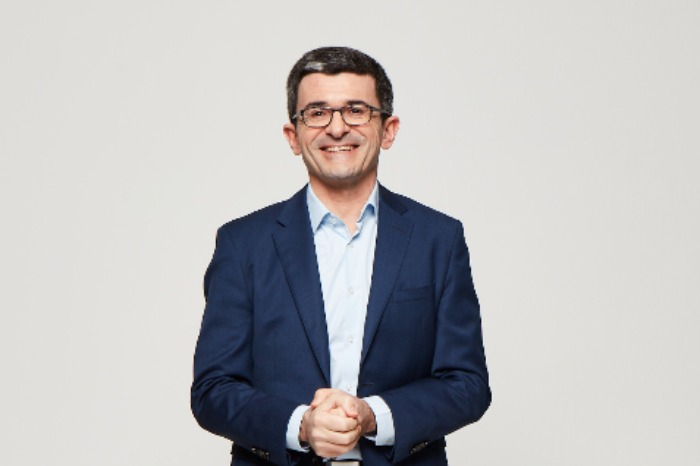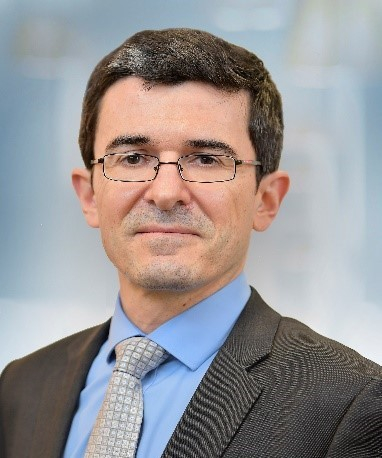Real estate
Residential, urban logistics in Europe are attractive: Patrizia
Mahdi Mokrane, head of investment strategy & research at Patrizia, focuses on real assets where rental income beats inflation
By Jun 21, 2022 (Gmt+09:00)
long read
Most Read
LG Chem to sell water filter business to Glenwood PE for $692 million


Kyobo Life poised to buy Japan’s SBI Group-owned savings bank


KT&G eyes overseas M&A after rejecting activist fund's offer


StockX in merger talks with Naver’s online reseller Kream


Mirae Asset to be named Korea Post’s core real estate fund operator



Despite a number of global market uncertainties, there is value in real assets where rental income grows faster than inflation, Mahdi Mokrane, head of investment strategy & research at asset management firm Patrizia AG says. Particularly, residential and urban logistics are among the best sectors in Europe, followed by food-anchored retail that can tackle inflation, he told The Korea Economic Daily in an interview on June 19.
There are also positive global trends for real assets: demographics, urbanization, digitalization and decarbonization. These four trends will boost investment in real estate, smart building infrastructure and the environmental, social and governance (ESG) sector, he said. At the same time, we need to be cautious on inflation, supply chain disruptions and potential risks around global debt, he added.
In terms of geography, Patrizia focuses more on cities than countries as cities are more important in terms of achieving investment performance. Each city has its own strengths: Paris is diversified with a broad range of industries; Munich is poised to see rapid population growth; the financial, life science and tech ecosystems in London are great. When looking at countries, the investment firm highly values a strong economic backbone and a good energy mix, he said.
Headquartered in Ausburg, Germany, Patrizia manages more than €55 billion ($58.2 billion) in real assets, including €48 billion in real estate and the remaining in infrastructure. It allocates 55% of its AUM in Germany, Austria, Switzerland and central and eastern Europe; 10 to 12% each in the UK & Ireland, France & Benelux and APAC & Americas. Core & core plus account for 81% of its strategies. The following is an edited transcript of the interview with Mokrane on June 19.
▲ How has the Russia-Ukraine conflict affected European real asset markets?
“The war has exacerbated inflationary pressures and real estate investors have had to deal with two key impacts from this. One is rising construction costs for buildings. The other is increasing indexation of income based on long-term contracts.”
“The first impact on construction costs is a negative one, and the second impact is positive as real estate and infrastructure are strongly correlated to inflation.”

▲ Where are the risks building up most in Europe?
“The key risk is a recession. Inflation will compress households' net disposable income. If in addition, central banks raise interest rates too much, it may cause a recession.”
“This is probably the more of a factor in those economies highly dependent on fossil fuels, such as central-eastern Europe. It is less risky to countries like France or to a lesser extent Germany that have more diversified sources of energy, including renewables and nuclear energy, and are not too dependent on gas or oil from Russia.”
▲ What are the fundamentally positive trends in global real asset markets?
“There are four trends: demographics, urbanization, digitalization and decarbonization. Firstly, the growing populations in the world need more real estate and infrastructure. We see great opportunities in each demographic cohort. For example, senior living for the aging population and student housing for more international students coming to key European cities. Also, the trend of urbanization in Europe wasn’t heavily challenged by the pandemic. We see successful cities continuing to attract more people who want to work, shop and play there.”
“Digitalization is also a very positive trend. We use the trends of digitalization in our real estate strategies for smart buildings and smart cities – for example, we install sensors in buildings to optimize energy consumption and air quality control. We also invest in fiber systems and digital sensors in key cities. The last trend is decarbonization where we measure the carbon footprint of our assets and aim for best-in-class business practices and achieve international labels. Environmental, social and governance (ESG) and decarbonization are fundamental to our strategies to build thriving communities and sustainable futures.”

▲ What do you see as disruptors in the market?
“Basically, I would say inflation and deglobalization. The more negative mega-trends are the US-China rivalry and global supply chain disruptions. The COVID pandemic and these deglobalization risks have changed the global supply chain paradigm – it was 'just-in-time' for production in the past. Now it is 'just-in-case' to eliminate the disruption risk by keeping a larger amount of inventory closer to home. This tends to be good for logistics markets.”
“We are also cautious of potential risks around global debt. The debt levels have increased globally and this will inevitably cause some volatility in financial markets. Additionally, we could still experience pandemics in the future. There is no guarantee that they won’t be disruptive. Therefore, we have to adapt and be flexible in our portfolio.”
▲ In which real estate sectors do you see value amid high inflation and rising rates?
“We see value in the assets where rental income will grow faster than inflation. Essentially, our best sector is residential, followed by urban logistics, which is in strong demand for efficient delivery and storage of goods. Particularly in Europe, there is a very strong growth in e-commerce that drives high demand for the urban industrial sector. Lastly, I would say that food-anchored retail is a sector that can handle inflation. The retailers in food-anchored, often called necessity retail, are commonly able to pass on the inflation to the end-consumer.”
“Therefore, residential, urban logistics and food-anchored retail and maybe a couple of others in specialized niche markets are the ones where we see the best value today.”
▲ What are some real estate sectors to avoid?
“I would say discretionary retail is one of these sectors. Some large shopping centers may be challenged as consumers are facing higher costs of living, transportation and energy. So, they may spend less on fashion and other discretionary items than before.”
“B-class offices may also be challenged as well due to the increasing cost of future-proofing these buildings in the context of ESG. Some old B-class offices need to increase costs to achieve decarbonization and attract tenants, but often it will be difficult to pass on higher rents to their office tenants.”
▲ Korea's prime office market is heated in the post-pandemic era. How do you foresee prime office trends in Europe?
“The pricing of prime offices may be a little challenged, but we don't believe it's in a major depression. Prime office yields have compressed in Europe to a large extent due to the very low yield environment as investors typically only require a 250-300 bps premium over government bond yields to invest in prime offices. However, we think tenant demand for prime offices will remain resilient. For example, we have seen more people return to prime offices than to B-class offices."
"Best-in-class offices will continue to attract demand as they offer flexibility, well-being and good transportation facilities. Some active buyers, who believe rental growth will compensate for the interest rate hikes, invest in full equity for long-term holdings.”

▲ How is Patrizia structuring deals to hedge risks and take advantage of current market circumstances?
“It depends on the risk style. For core investment, we add buffers like the security of interest rates for the sectors we prefer, such as residential, urban industrial and food-anchored retail. We choose floating rates for some assets where we expect fast rental growth, then we wait to shift the loan structure to a fixed rate.”
“For the value-add strategies, when we pursue forward funding for developments, we typically ensure that the main construction materials have already arrived in the country or the city. We don't take any risks in the supply chain of construction materials and try to fix the construction costs as early as possible to make a good investment. We also renegotiate with the sellers to get better pricing opportunities.”
▲ What could be the role of real asset investments in the current market environments?
“In terms of risk-return profile, real assets are somewhere between equities and bonds and strengthen multi-asset class portfolio diversification. Using core strategies you can construct more diversified portfolios and earn income that is significantly higher than from fixed-income securities. You can also move up the risk curve using value and optimistic strategies and achieve capital growth similar to what we see in private equity. Real assets also offer an inflation hedge as they have long-term contractual income contracts linked to inflation. We have seen that for the right sectors income can grow faster than inflation, and a number of global investors are increasing their real assets exposure today.”
▲ In which countries and cities in Europe do you see value today?
“Our philosophy is that we look at cities more than countries as cities are more important in terms of achieving investment performance. For example, the population in the top five cities of Germany is growing although it is not impressively increasing in the country as a whole.”
“By city, we think ecosystems for financial, life science and tech in London are great; Paris is very diversified – there are all sorts of industries and service companies. Munich is expected to see rapid population growth over the next five to seven years.”
“When looking at countries, we focus on a strong economic backbone and a good energy mix. I would say the Nordic countries, as well as Germany, France and Benelux look very resilient and defensive. The UK has the potential for a strong bounce back in offices and retail, fast recovering from Brexit. We are more cautious about southern Europe such as Spain, Portugal and Italy for the short term and expect a mid-term bounce back. We would be more cautious on central and eastern Europe given the situation today in Ukraine.”

▲ How does Patrizia reflect ESG guidelines in its investments?
"Our motto is building communities and sustainable futures. We invest in renewables and social infrastructure and have launched an impact investment fund called the Sustainable Communities fund. Our impact investment funds aim to achieve superior financial investment performance but also exceed benchmarks based on agreed-upon United Nations’ sustainable development goals (SDGs)."
"We have accelerated renewable energy across our portfolios: our Germany-based residential assets use renewable energy in the common areas. This extends to our assets in the Netherlands and Denmark. We are also intensifying our diversity and equality best practices."
"So, we set the ESG goal, measure our impact using data and demonstrate performance annually to our stakeholders. The ESG trends will be a massive change – if you don't incorporate them as an asset manager today, the clients will leave tomorrow."
▲ How does Patrizia build partnerships with Korean investors?
"We have long-term partnerships with investors in Korea such as NPS and I am pleased to say that some of the best investment ideas have come from our discussions with our Korean investment partners. They are very sophisticated investors looking to use real assets for a combination of income, capital appreciation and diversification in their multi-asset class. By being a partner over time, we build trust, adapt to the clients’ needs and offer some of our best ideas using tailored strategies."
"We are also actively engaged with major Korean investors that are seeking single asset investments for their core strategies, interested in our flagship fund products and lastly our infrastructure debt and equity products. We hope that our products and services will provide solutions to the investment needs of our Korean investors and that we remain long-term partners."

Prior to joining LaSalle, he worked at AEW Europe as head of research and strategy and was a member of the company’s European investment committee as well as the global securities allocation committee. He also worked closely on real estate debt and equity transactions in both the UK and Continental European markets. Before joining AEW, he was director for research and training at IPD in France from 2001 to 2004. He has a doctorate in economics and finance from EHESS and a master's from Dauphine University.
Write to Tae-Ho Lee and Jihyun Kim at thlee@hankyung.com
Jennifer Nicholson-Breen edited this article.
More to Read
-
 Alternative investmentsPatrizia sells Astro Tower in Brussels on behalf of Korean LPs
Alternative investmentsPatrizia sells Astro Tower in Brussels on behalf of Korean LPsDec 13, 2021 (Gmt+09:00)
2 Min read -
 Europe’s residential property market to fare better than fixed income: Patrizia
Europe’s residential property market to fare better than fixed income: PatriziaAug 19, 2020 (Gmt+09:00)
3 Min read -
 POBA, PFA, Patrizia co-invest in Europe’s $1.3 bn logistics portfolio
POBA, PFA, Patrizia co-invest in Europe’s $1.3 bn logistics portfolioDec 12, 2019 (Gmt+09:00)
1 Min read -
 Greystar, Patrizia secure Korea Post’s $100 mn housing investment
Greystar, Patrizia secure Korea Post’s $100 mn housing investmentDec 13, 2019 (Gmt+09:00)
1 Min read -
 Europe’s residential assets seen as attractive play: Patrizia
Europe’s residential assets seen as attractive play: PatriziaDec 16, 2019 (Gmt+09:00)
2 Min read
Comment 0
LOG IN


